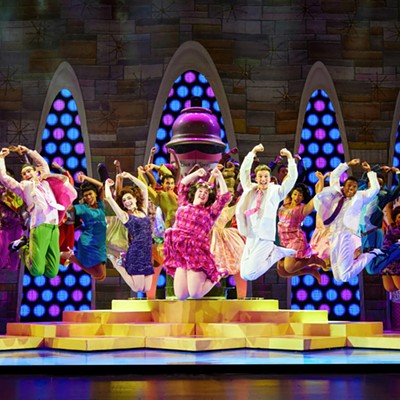Whoa! This thing takes a turn.
And then it takes another one.
Katori Hall's strange little play about Dr. Martin Luther King Jr.'s final night on Earth is beckoning from downtown's Temple of Music and Art. The Mountaintop is a joint production of Arizona Theatre Company and the Penumbra Theatre Company in St. Paul, Minn. These co-productions are becoming more common as professional regional theater companies strive to get the most bang for their production bucks, which are required in increasingly lofty amounts for high-quality work.
Hall's piece is curious. Hers is a loosey-goosey approach to what many would expect to see: a sensitively wrought play about an iconic figure in his final hours, which might include moments of rambunctiousness to show his humanity, mixed with some soul-searching that yields new insights. In fact, this is what we assume we will see, because press materials address the play in vague terms.
In fact, Hall does let us witness a glorified figure behind closed curtains in a shabby hotel room who converses with a strange hotel maid and who demonstrates feet of clay (and foot odor and holes in his socks).
The trouble is that she blasts from what seems to be unfolding in the mold of the "well-made play" convention to a type of magical realism that would make Gabriel Garcia Marquez proud. And then she leaps into yet another dimension—let's call it the "PBS documentary style, adapted for the stage."
Some may call it inventive and courageous; some call it gimmicky. The necessity of a surprising shift does seem more like something you'd find at the murder mystery dinner theater than what we would expect and desire in a befittingly eloquent play about an eloquent man.
Hall is not eloquent. But she is effective. With the guidance of director Lou Bellamy, James T. Alfred as King and Erika LaVonn as Camae create a world into which we are guided to the mountaintop and given a glimpse of the other side. In the final moments of the play, it is almost impossible not to respond wholeheartedly to the tone, the visual impact and to King's own call to us delivered by Alfred. Although our spirits soar, we are aware that the journey is incomplete, and our hearts break at the same moment they are sent soaring.
The setting is room 306 of the Lorraine Motel in Memphis, Tenn., the evening before King is assassinated in early April 1968 on the balcony of the shabby establishment. As we enter the theater, we are aware of the set and hear the thunderstorm and see the rain falling steadily outside the windows. (The terrific efforts of designers Vicki Smith, Don Danutzer and Martin Gwinup are vital to our experience.) We also see King as he goes about the solitary business of winding down after a long day, doing the mundane kinds of things one does alone in a motel room. He has just delivered one of his most moving speeches, in which afterward it seems that he was aware that his own life would be shortened, and that he would be unable to experience what would become a monumental shift in American history.
He wants some coffee to fuel his duty to write another speech. He is told that room service is no longer available, but that perhaps some coffee can be delivered. A hotel maid arrives with the coffee, and a quirkiness that is almost befuddling. It's her first day, she says, and because she is well aware of who he is, she bends the rules and stays to chat, smoke, flirt. She provides King with cigarettes and a thunderous sermon in which she claims that the whole racial inequality situation can best be served by killing the white man. She's foul-mouthed, but apologetic. Really, she's a strange bird, and the interactions between the two, although funny enough, become tiresome after about 40 minutes. What the heck is happening here? I was becoming impatient and annoyed with the actors, with the script, with the direction.
And then, it takes that turn.
Hall is a young playwright, and although she has already demonstrated considerable skills, her youth shows here. And that's both a good and not-so-good thing. She strives for much and is willing to take some real risks. But her treatment doesn't show us much about King that we didn't know or that we couldn't easily speculate about based on what we do know. We're not really left with new insights about the man and what he was about. One could judge what is evidenced here an immature glibness, annoying at least, possibly offensive at worst. It's a piece that seems at odds with itself, that relies on gimmickry and theatrical tricks. This cheapens Hall's efforts. But it doesn't spoil the evening.
Hall hails from Memphis, and her mother, Carrie Mae, wanted to gather with others to hear King, who was in Memphis because of a sanitation workers' strike that was fueling heated feelings among both the white and black populations of the segregated city. But there were rumors of possible violence that discouraged her from attending. It's easy to see that The Mountaintop could easily have been a writing exercise, with Hall riffing on an imaginary meeting of Mom and the man. A silly, sit-com feeling coupled with a gimmicky escape from what Hall must have known was wearing thin almost dooms the piece.
But it's King's own voice that ultimately rescues a shaky script, and sends us sobered to the ongoing work of building the promised land.









